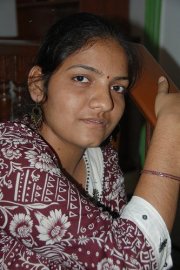In the summer of 2003 Aarti Naik, who lives in a slum district of Mulund, a suburb of the Indian city of Mumbai, failed a key school test. Her father, with very traditional views of girlhood decided enough was enough. She needed to leave school and start earning money until the time, hopefully, some nondescript drifter would marry the girl without a dowry and take her off his hands.
So for three years she worked, night and day, making ribbon flowers for sale, earning 9 rupees per days. She rarely left the family home, a 15x15ft single room divided into a living area and a tiny space for cooking and washing – her father disapproved of an unmarried young woman crossing over the threshold into the street.
A life of grinding, soul destroying poverty beckoned. She would grow up, like her mother and neighbours, in meek acceptance of her lot, ignorant and illiterate, her spirit crushed out of her by the prejudices of her father and her culture.
Howeve, in 2006, after three long years with the ribbon flowers, she decided to defy her father and retake her school tests – and passed. In another act of defiance she undertook a two year course to complete her higher certificate, graduating in 2008.
But those final years of study were hard because the girls were only taught to learn things by heart
“All through school, I was taught to rote learn. I’d rarely understand and assimilate. Reproducing what I read in my words was unheard of till then,”
She realised that many of her friends fell by the wayside because they didn’t know how to learn. So she set up her own tiny school and offered to teach the daughters of her neighbours – for nothing. She applied to a local NGO for some funds – and set up Sakhi (“female friend”)
At Sakhi, Aarti teaches them basic English and focuses on reading and writing. She encourages them to understand what they read and asks them to narrate or write down what they understood.
The kids are engaged in simple letter games like one involving a set of homemade cards — each carrying a letter of the English alphabet, which they must arrange in the proper order.
Aarti also ensures that they interact with each other in English, a language that is rarely spoken in the neighbourhood
What she soon discovered was that the girls’ mothers, who initially saw Sakhi as a means of getting their daughters off their hands for a few hours each day, suddenly realised that they had gained in self esteem as well as in terms of academic learning – which is why she saw the involvement of the mothers as the key to the success of her model.
At the end of the first year she organised an event to which the parents were invited. Each girl gave a little speech.
Parents who thought their girls were demure and didn’t talk much were surprised to see how confident they were outside of their homes.
Imagine the tears of pride at those moments of revelation.
Provided with seed money by local charities Aarti has a vision. She hopes to develop Sakhi as a model to get girls in slum communities across India to develop enough self confidence to lift themselves out of the cycle of poverty.
I think Robert Stacy McCain would agree that this is real women’s liberation. This is one tiny act of defiance against the bonds of ignorance and submission that hold so many women in thrall in societies across the globe. And it is from millions of such individual actions that true social progress can be made.
Read more about Aarti here – then visit her facebook page and ask to be her friend with a message of pride and respect.
She deserves no less.

